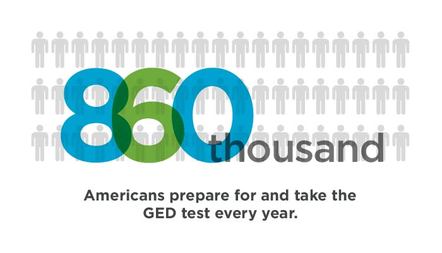 Courtesy of New Readers Press
Courtesy of New Readers Press As a teacher in a GED school, the new year brings a new exam, aligned to the Common Core State Standards, that will ask students to go far beyond what the previous test ever asked of them. There is no doubt the transition will be a rocky one as students learn to develop college-level, critical thinking skills. I’m up for the challenge of getting them there, but I’m also aware of the realities: In a school like mine, where we receive students at just about every grade level, we have to consider the effect of telling a 20-year-old student, with a third-grade reading level and a five-year gap in his education, that his next stop is a GED that demands 12th-grade proficiency. I’ve seen it too many times: The student comes in expecting that, just like his more advanced schoolmates, he will study for several months — maybe a year — pass the test, and be on his way to college. A year later, aware of how high a climb he faces, he packs it in and heads for a job market where he faces little chance of upward mobility in the years to come.
Much of the mounting criticism of the Common Core has suggested that the implementation of more rigorous standards will hurt our students by setting unachievable goals and in so doing, affect student and teacher morale. On the contrary, a study suggests that, in fact, higher standards help even those students who are below grade level. There is a legitimate concern that by focusing our students so intensely on a bar beyond their reach — with little-to-no official recognition of the ladder rungs they climb along the way — we may be setting them up for failure. Despite the evidence that high standards do help student achievement across the board, my concern is for the students who may no longer be in school by the time the test is administered — those for whom the bars we set are so far beyond their current level that they simple give up the ghost on ever reaching it.
Last month I wrote about how we must dramatically change grading to give students feedback that is useful for continued growth. Perhaps we can also consider setting more official benchmarks or certifications with real value along the path to high school graduation. For example, if a student is highly proficient in math but behind in reading, why not certify him as college-ready in math? No, it wouldn’t (and shouldn’t) be enough to graduate because our students need well-rounded preparation to keep all options on the table for their futures; but it would build confidence and momentum for students who need it and help them focus where they need the most work. (Jennifer Davis Bowman also offers some important ideas on how to focus on progress in the classroom, rather than mastery alone.) These kinds of benchmark recognitions could exist for content or skills (like computer literacy) that students need to succeed in college and beyond.
Proficiency matters, but so does progress. If our students can see that moving forward matters and we can make that process meaningful, our traditional measures of success (like test scores and diplomas) will follow — and we’ll be better off for it.
Scott Goldstein is a social studies and ESL teacher at a D.C. public charter school. He can be reached via email or Twitter.

 RSS Feed
RSS Feed